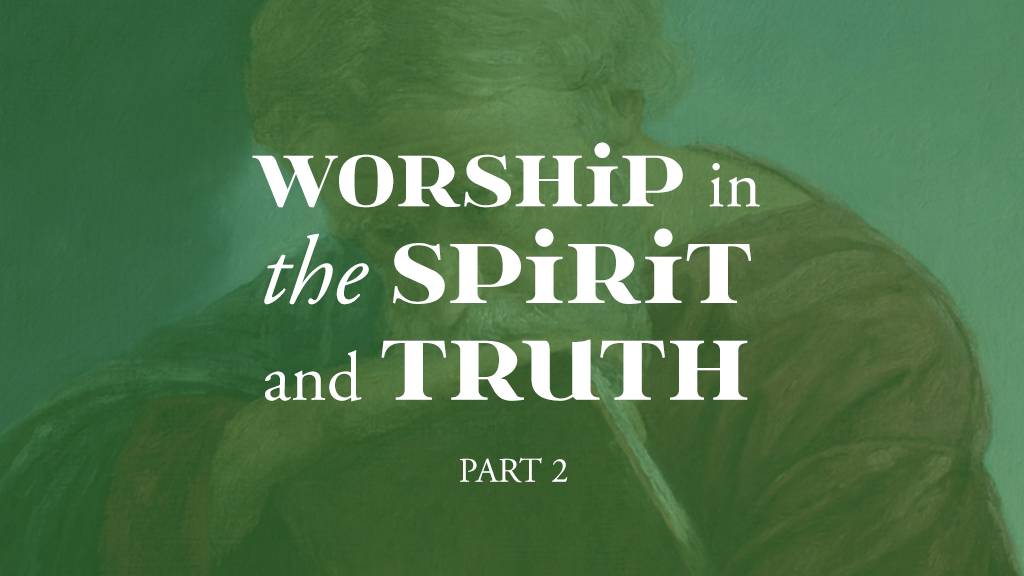Don’t miss Part 1 which breaks down the Greek grammar of John’s “in spirit.”
A Biblical Theology of “Spirit” in Chapters 1-12 of John’s Gospel
Around the end of the first century, John son of Zebedee, a former Galilean fisherman, sat down to write the account of his three-year adventure with the now ill-famed Rabbi, Jesus of Nazareth. This radical teacher, once loved by the multitudes, was eventually crucified. His crime was blasphemy—He claimed to be the Messiah, the Son of God. Over six decades had passed since the execution of this dear friend and mentor. Although there were now thousands who had converted to the teachings of Jesus as carried out by the Apostles, John was the last living Apostle and he was now in exile on the island of Patmos. From the outside looking in, John should be considered a failure. However, his Savior and Lord—the Resurrected One who had ascended to the Father before John’s eyes—had promised that he and the other disciples would have the comforting presence of God’s Spirit. Although in exile with little to no human companionship, John was certainly not alone!
But this promise of the soon-coming Comforter was not in the midst of pleasant circumstances. A frightening scene unfolds as Jesus gathers His disciples together during the final hours before His predicted death. The reader can sense the agony of abandonment as Christ nears Calvary. John was privy to certain information (John 13:28-29)—while the other disciples sat arguing over who would be the greatest in the kingdom and stating reasons why they would never leave Christ, it is clear that possible abandonment is on the minds of everyone. When John quietly consulted the Master he was given a sign: The one who receives this piece of bread after I have dipped it, is the betrayer. John watched as Judas took the bread and exited into the night to carry out his vicious plot of betrayal (John 13:23-30). How gripping it must have been for John to witness his cohort’s abandonment. With this desertion fresh in mind, John was struck with the news of another Friend who would also be leaving.
Jesus announced: I will only be with you for a little while. You will seek me, but where I am going you cannot come (John 13:33). After the initial panic set in and the disciples finished questioning Him (John 13:31-14:14), Jesus reassured the disciples that they would not be left as orphans. In a beautiful affirmation of the Triune God, Jesus unveils a truth that had not been fully revealed until this point—the disciples and the other believers would be constantly accompanied and aided by God’s own Spirit (John 14:15-31). They would be aware of this comforting presence like that of their friendship with Jesus. Christ then divulges a doctrine of the Holy Spirit intertwined with teachings that would serve the disciples in order that they would be able to persevere in their faith until the last day (John 15-16). It is with this comfort that John writes from Patmos.
The reader must keep in mind that John’s narrative is not a mere historical record—very obvious theological themes present themselves. Without a doubt, a theology of the Holy Spirit within this account of Christ’s life is being developed beginning in Chapter 1. At first it is subtle. In the opening chapters, it is apparent that John would have his readers to focus on the Word that became flesh and dwelt among us. But as the narrative unfolds, a clear theology of the Holy Spirit is observed which has its climax in Chapters 14-16.
On Whom You See the Spirit Descend (John 1:32-34)
32 And John (the Baptist) bore witness: “I saw the Spirit descend from heaven like a dove, and it remained on him. 33 I myself did not know him, but he who sent me to baptize with water said to me, ‘He on whom you see the Spirit descend and remain, this is he who baptizes with the Holy Spirit.’ 34 And I have seen and have borne witness that this is the Son of God.”
Each gospel writer has his own approach to recording their Spirit-inspired recollection of the life of Christ. Of the four gospel writers, John provides the most in-depth look at the Spirit.[1] In his presentation of these theological themes, John does not seem to be as concerned about the painstaking details of the historical record; in fact, in this passage, he does not even state that the descent of the Spirit in dove-like form occurred at the time of Jesus’ baptism.[2] He fails to mention that Jesus was even baptized! If his main objective was the recording of historic events, he’s not doing a very good job in these verses. It is clear that his aim is theology. In this passage, John helps us to understand that the baptism of Jesus is less about the event itself (and whether we should practice it[3]), and more about its importance to the earthly ministry of Christ. In this opening chapter, Jesus is inaugurated as the Spirit-approved, Spirit-accompanied, and Spirit-assisted Son of God sent from the Father. The gospel writer uses John the Baptist’s testimony as affirmation that Jesus is this individual.
God revealed to John the Baptist that the identity of the Chosen One would be made known by the presence of the Spirit remaining on Him (1:32-33a). That John (the author) doesn’t mention the voice from Heaven (as the other Gospel writers) at the time of the dove-like appearance shows all the more that the Spirit’s presence was monumental in not only identifying Jesus, but also empowering His earthly ministry. This is also seen in the reason Jesus came—to baptize with the Spirit (1:33b). At this point, John does not explain what this means, but comes back to it in Chapter 3. This shows that John has a progressive trajectory of thought in mind for his theology of the Spirit. He is not afraid to reveal facts about the Spirit and then explain them later in the narrative.
Born of the Spirit (John 3:1-21)
5 Jesus answered, “Truly, truly, I say to you, unless one is born of water and the Spirit, he cannot enter the kingdom of God. 6 That which is born of the flesh is flesh, and that which is born of the Spirit is spirit. 7 Do not marvel that I said to you, ‘You must be born again.’ 8 The wind blows where it wishes, and you hear its sound, but you do not know where it comes from or where it goes. So it is with everyone who is born of the Spirit.”
In His conversation with Nicodemus, Jesus makes it clear that a person cannot hope to be welcomed into God’s kingdom unless he is born of the Spirit (3:5). Clearly, as will be seen in this section (as well as in John 4 and 6), the Spirit is necessary for salvation.[4] The rationale is simple: the one that is born of flesh is flesh and the one born of Spirit is spirit (3:6). While the rationale may be simple, this truth is not easy to accept. For this reason, Jesus said, “Do not marvel that I said to you” (3:7). The difficulty in understanding the Spirit’s second birth is likened unto the blowing of the wind (3:9). Just as the unseen wind blows, its effects are noticed. Likewise, the Spirit’s work is hard to understand, yet its results are seen in the transformed life. Newman has helpfully observed that there is “a play on words in verse 8a, one which comes through nicely in Greek or Hebrew, but which is difficult, if not impossible, to bring out in English translation without the help of a footnote. In Greek, as in Hebrew, the same word may mean either ‘wind’ or ‘spirit.’ In this context most translations take ‘wind’ to be the basic comparison, and so have translated in this way.”[5]
Jesus makes a point that has been debated by various scholars. Exactly what does it mean to be “born of water and the Spirit”?[6] John the Baptist had stirred the nation by his ministry and stress on repentance (Matthew 3:1–6). “Water” would remind Nicodemus of the Baptist’s emphasis. This also clarifies John’s statement in Chapter 1. It was recorded that “the One whom John saw the Spirit descend and remain, this is he who baptizes with the Holy Spirit” (1:33). John’s baptism was of water which indicated repentance; Christ’s baptism was of the Spirit, which meant regeneration (born again).
The Spirit without Limit (John 3:31-36)
31 He who comes from above is above all. He who is of the earth belongs to the earth and speaks in an earthly way. He who comes from heaven is above all. 32 He bears witness to what he has seen and heard, yet no one receives his testimony. 33 Whoever receives his testimony sets his seal to this, that God is true. 34 For he whom God has sent utters the words of God, for He gives the Spirit without measure. 35 The Father loves the Son and has given all things into his hand. 36 Whoever believes in the Son has eternal life; whoever does not obey the Son shall not see life, but the wrath of God remains on him.
After the encounter with Nicodemus (3:1-21), John ties it back to Chapter 1 by recounting the testimony of John the Baptist. Under inspiration, John weaves together the testimony of John the Baptist about the Christ, and Jesus’ own testimony of Himself to Nicodemus. The themes in this portion are very similar to the previous, which give validity to the theory that “born of water” is metaphoric language for John the Baptist’s message of repentance and “born of the Spirit” refers to the Christ’s baptism of the Spirit. In John the Baptist’s continued testimony, the Father, the Son, and the Spirit’s oneness are affirmed. Christ is to be believed because He speaks the truth of God, and He has been given the Spirit without limit (3:34-35). This is reminiscent of the event in which God confirms the Son with the Spirit’s presence in dove-like form (1:32-34). However, previously, the sign of the Father’s Chosen One was this appearance of the Spirit; the sign in this passage is the consistency in the message of the Son with the Father made possible by the Spirit.[7]
Folded away in the passage is a verse vital to our understanding of the Chapter 4 reference. Here in Chapter 3, John provides an expounded version of the phrase “Spirit and truth.” He states, “For he whom God has sent utters the words of God—truth—for he gives the Spirit without measure—Spirit.”[8] The statement “the Father loves the Son and has given all things into his hand” (3:35) is akin to the “no man comes to the Father but by me” claims. In order to become a worshiper of God, you must come through Christ—the One affirmed and led by the Spirit and the speaker of God’s truth.
Worship Him in the Spirit and Truth (John 4:7-26)
23 But the hour is coming, and is now here, when the true worshipers will worship the Father in spirit and truth, for the Father is seeking such people to worship him. 24 God is spirit, and those who worship him must worship in spirit and truth.”
Christ’s testimony of Himself to a man who fit the Jewish religious mold (Nicodemus) intertwined with the testimony of a man who broke the religious mold (John the Baptist) are complimented by Christ’s testimony of Himself to a Samaritan woman who was despised by the Jewish religious elite. Based on John the Baptist’s testimony, the Spirit-approved, Spirit-accompanied, and Spirit-assisted Son of God (1:32-34) is the only one who can utter God’s truth (3:31-36). “Worshiping in truth is connected with Jesus, the Messiah who explains everything (4:25–26). This picture of Jesus will be developed more when it is said that his words are spirit and truth (6:63) and he is himself the truth (14:6). So worshiping in Spirit and truth is related to the very character of God and the identity of Christ.”[9] God is not providing recommendations for moving worship services or making a jab at the traditionalism of the Jews and Samaritans. So much more lies within this portion of Scripture. God is actively seeking out the kind of worshiper that would worship him in Christ—Spirit and Truth.
In the opening verses, John gives background information (4:1-9) for what would be another theological development. After the woman snarked back with statements rooted in racism and social discrimination, Jesus answered her with offers of living water (4:10-14). Thirst-quenching and/or living water was a favorite expression for the prophets (Isaiah 44:3; 55:1; Jeremiah 2:13; 17:13; Zechariah 14:8). Christ’s only two references to living water in the Gospel of John are paramount for understanding the context of John 4:23-24 and that it is a clear reference to the Holy Spirit. The only other time John uses “living water” in his gospel is in 7:38-39. He explicitly states that “living water” is the Holy Spirit who is yet to come. Like Nicodemus (and the disciples), the woman clearly does not comprehend this reference to the Holy Spirit because she asks for water that would quench her thirst forever (4:15).
The conversation changes gears. By referencing her marital status, Jesus reveals that He is omniscient and that she is a sinner (4:16-18). The Samaritan woman then changes the subject. Like many sinners faced with the reality of their sin, she attempts to “talk religion” with this supposed Jewish prophet (4:19-20). Jesus reveals that everything the Jews and the Samaritans value concerning the worship of Jehovah is about to drastically change. He uses the phrase “the hour is coming.” The other two instances when Christ uses this phrase (in John’s gospel), he makes reference to the death of Christ (5:25, 5:28) and the age of persecution in which the prophets would experience the Spirit’s presence (16:2, 16:25, 16:32). This phrase indicates a soon coming event. The dawning of the age of the Holy Spirit’s indwelling is just around the corner when worship in the temple would be abolished (4:21-22). A time is coming when the true worshipers will worship God in the Spirit and truth, which are found only in Christ. God is spirit, so temples and synagogues do not suffice; He will indwell His worshipers (4:23-24). The woman suggests that she would rather wait for the long-awaited Messiah to hear of this new covenant; “Jesus declares, “I, the one speaking to you—I am He” (4:25-26).
The Spirit Gives Life (John 6:60-65)
“Do you take offense at this? 62 Then what if you were to see the Son of Man ascending to where he was before? 63 It is the Spirit who gives life; the flesh is no help at all. The words that I have spoken to you are spirit and life. 64 But there are some of you who do not believe.” (For Jesus knew from the beginning who those were who did not believe, and who it was who would betray him.) 65 And he said, “This is why I told you that no one can come to me unless it is granted him by the Father.”
After He fed the multitude, Christ gave very hard teachings about the necessity of eating His flesh and drinking His blood (6:1-59). This portion closely resembles the conversation with Nicodemus: 1) the listeners are confused (6:60), the Spirit is giving life (6:63), and 3) the Spirit is the way to the Father (6:65). John spoke first of “the need for the Spirit (6:63), then of the need for faith (6:64), and then of the Father’s decisive action (6:65). The need for the Spirit was already developed in the conversation with Nicodemus (3:3–8). By identifying the Spirit as the one who gives life (6:63), he provides the foundation for what was said earlier about the necessity of being “born of the Spirit” (3:8).”[10]
The Spirit Had Not Been Given (John 7:37-39)
37 On the last day of the feast, the great day, Jesus stood up and cried out, “If anyone thirsts, let him come to me and drink.38 Whoever believes in me, as the Scripture has said, ‘Out of his heart will flow rivers of living water.’” 39 Now this he said about the Spirit, whom those who believed in him were to receive, for as yet the Spirit had not been given…
The last passage that mentions the Spirit prior to Christ’s extensive teaching (Chapters 14-16) on the subject is found here in 7:37-39. Jesus is in Jerusalem during the time of the Feasts of the Tabernacles, and he has made quite a stir among the religious crowd over His healings. Using the same thirst imagery he used with the woman at the well, Jesus declares that if anyone is thirsty, out of his heart would flow rivers of living water.[11] In this section it is evident that when the believer accepts Christ, he receives the Spirit—the Living Water (the obvious exception would be those first-century believers who had to wait for the Spirit’s post-resurrection coming).
This is a significant passage in understanding John’s presentation of Christ’s theology of the Spirit. While the people who heard Jesus teach that day would not have understood his teaching, like Nicodemus (John 3) and the disciples (John 6), John still wanted his post-resurrection, late first-century readers to understand that Jesus spoke of the Spirit. John explicitly states, “Now this he said about the Spirit, whom those who believed in him were to receive, for as yet the Spirit had not been given, because Jesus was not yet glorified” (7:39). “The phrase ‘the Spirit was not yet’ in 7:39 should be interpreted relationally. Although people had already begun to experience the divine gift in relationship with Jesus, the Spirit was not yet active/available in the same way that was only possible later.”[12] This text is vital to our understanding of John 4 for the simple fact that Jesus would have spoke of the Spirit to pre-ascension believers, even though it would be a season until they received the Spirit. This text is also important in understanding the giving of the Spirit which will be discussed in a later section.
A Biblical Theology of the Holy Spirit in Chapters 13-21 of John’s Gospel
It becomes very apparent that Christ’s revelation of the Holy Spirit to His disciples in the upper room brings “color” to John’s presentation of this doctrine. Prior to Chapter 13, the word used in reference to the Spirit was πνεῦμα (one use of πνεῦμα ἁγίῳ in 1:33). In Chapters 13-21, three titles for the Spirit are used by John: The Paraklétos, The Spirit of Truth, and The Holy Spirit.
The Paraklétos (John 14:16, 14:26, 15:26, 16:7)
The Greek word parakletos is used a total of five times in Scripture; five times in John’s Gospel and once in his first epistle. It should be noted that Christ is called the parakletos which shows once again the close bond of Christ and the Spirit. When this word occurs in extra biblical literature, it means “one who appears in another’s behalf, mediator, intercessor, helper.”[13] The fifth occurrence in which Jesus is called the parakletos (1 John 2:1) may at first sound like a contradiction, or at least a point of confusion. But, “the gospel of John refers to the coming Spirit as ‘another Paraclete’ (John 14:16). It thereby implies that Jesus is the former Paraclete and thus parallels the same notion in 1 John.”[14] One overwhelming commonality of the paraclete passages is the fact that he is sent by the Father in the absence of the Son.
While most scholars suggest that the Spirit’s work is that of a helper and comforter, much of the church world has affirmed that the Spirit’s work is to convict of sin. This is taken by the single reference to the Spirit’s “conviction” in John 6:8. However, we should be careful not to overstate this. “This section is fraught with interpretive challenges to the point that nearly all commentators preface their discussion of John 16:8-11 with a disclaimer about the difficulties involved in interpreting the passage.”[15] Many scholars have recommended that a more accurate translation of ελέγχω is “convince.”[16] This translation seems to align more with the mission of the Paraclete. The important thing is that we would not reduce the Spirit’s work to conviction only as is so done by many in the pulpit.
The Spirit of Truth (John 14:17, 15:26, 16:13)
As the woman at the well found out, those who worship God must worship Him in the Spirit and truth. It follows logic that if this is what God requires, then the Spirit’s work would compliment this requirement. “The permanency of the Spirit was made evident in John 1:32-33, where the Spirit was seen not just descending down, but abiding (or remaining) on Jesus. We should not miss the fact that the same word used in 1:32-33 to speak of the Spirit’s abiding on Jesus is also used in 14:17, where the Spirit abides with the believer. It is clear that the Spirit’s abiding with Jesus was an indicator of the permanency of the Spirit’s presence with him during his stay on earth.”[17]The abiding (μένω) presence of the Spirit in the believer’s life is permanent as well; as He abides, He comforts through truth.
We have already demonstrated that there is a clear connection between Christ and the Spirit, at the same time, there is a relationship between the Spirit and the Word—the Spirit of Truth—which can be seen in the connection between the incarnate Logos and the Spirit-inspired written Logos. “While the Word’s work is finished on the cross in some sense, it is not finished in an absolute sense. His work while physically ‘on the earth’ (John 17:4) and ‘in the world’ (17:13; cf. 17:18; 10:36) is finished in securing eternal life for his own on the cross, but the reception of this life by his own continues even when he is not ‘seen’ (14:19; 16:16-19; 20:29) through the reception of the word(s) that he continues to speak by the Spirit.”[18]
The Holy Spirit (John 14:26, 20:22)
Of the five times John uses the word “holy,” all five are in reference to God. Three of these five are in reference to the Holy Spirit. While his preferred term for the Spirit is simply “Spirit,” it is significant that the word “holy” (ἅγιος) is the only adjective used to describe the Spirit. Holiness and Sanctification are related terms which come from the same Greek word. To form the idea of “making holy” we would not say holify or holying; we would say sanctify or sanctifying. Thus, sanctification in a theological sense is the process of becoming holy. The “Holy” Spirit makes man’s sanctification possible[19] which comes by means of the Spirit’s work through the Word. Christ made it clear to the disciples that the Holy Spirit would “teach you all things and remind you of everything I have told you (John 14:26).” In his prayer to the Father, Christ asked that that the disciples would be sanctified (made holy) by the truth (John 17:17-19). This is in step with the Spirit’s work.
One difficult portion that deals with the Holy Spirit is found in John 20. “Despite most of our English versions, the text does not say ‘he breathed on them’ but simply ‘he breathed’ or, perhaps, ‘he exhaled’ (enephysēsen). “Apart from other compelling considerations, therefore, the verse should be translated, ‘And with that he breathed, and said, ‘Receive the Holy Spirit.’”[20] Also, we should understand that there is no intrinsic reason to think that they would “Receive the Holy Spirit” immediately.[21] It would be a few more weeks before the Apostles would receive the Spirit at Pentecost.
Summary
By developing a biblical theology of the Holy Spirit in John’s gospel, it has been demonstrated that the Holy Spirit is part of the Father’s requirement for true worshippers. This conclusion bears important practical implications for our worship:
- Jesus was the Spirit-approved, Spirit-accompanied, and Spirit-assisted Son of God sent from the Father. If Christ was dependent on the Spirit’s abiding presence, then certainly the believer should be as well. I believe this is something like what Paul meant when he told the Galatians to not just live in the Spirit, but to also “walk in step with the Spirit.”
- The believer is empowered and enabled by the Spirit in order that he might offer pleasing worship to the Father. By acknowledging this empowerment and enablement, we are admitting that at all times we are unable to please God apart from the Spirit.
- One who is not seeing the fruit of the Spirit in his life on Monday through Saturday will not offer on Sunday the kind of worship that the Father requires. True “in the Spirit” worship will be manifest in a person regardless of whether he is assembled with other believers.
- Spirit-enabled and Spirit-empowered worship is “in truth.” Christ was repeatedly affirmed as the embodiment of truth—the Word—and the Comforter who would replace the Son was called the “Spirit of truth.” Our acts of worship are prescribed by God’s truth and the words we use in our worship must be grounded in God’s truth. We approach the Father through Christ, in the Spirit and on the basis of the Word.
- The idea of “drumming up” worship excitement does not align with a Biblical view of the Holy Spirit. The Spirit’s work is not generated by man. An assembly of believers who are led by the Spirit through the Word will yield the kind of worship that is pleasing to God. Worship that is directed toward the Father, is made possible by Christ, informed by Scripture, and enabled by the Spirit.
Christians everywhere must learn what it means to walk in the Spirit and truth, for these are the kinds of worshippers that please the Father.
[1] Frank Pack, “The Holy Spirit in the Fourth Gospel,” Restoration Quarterly 31, no. 3 (January 1, 1989): 139.
[2] Blum, “John,” in The Bible Knowledge Commentary: An Exposition of the Scriptures, 274–275.
[3] Here in John’s gospel, “the question of the nature of (Christian) baptism remains undefined.” Borchert, John 1–11, The New American Commentary, 139.
[4] Cornelis, Bennema, “The Giving of the Spirit in John’s Gospel-A New Proposal?” Evangelical Quarterly 74, no. 3 (July 2002): 195, accessed March 4, 2015, MBU Online Library.
[5] Newman and Nida, A Handbook on the Gospel of John, 651–652.
[6] Blum, “John,” in The Bible Knowledge Commentary: An Exposition of the Scriptures, 281.
[7] Christ is the one with limitless authority of the Father by the Spirit. Lenski does not agree with this interpretation, but helpfully provides insight on the correct translation: “οὑκ ἐκ μέτρου is taken to mean ‘unmeasured,’ ‘without measure,’ ‘not by measure,’ a litotes for ‘in complete fullness.’” Lenski recommends that the disciples would be the eventual recipients of the R. C. H. Lenski, The Interpretation of St. John’s Gospel (Minneapolis, MN: Augsburg Publishing House, 1961), 291–292.
[8] Indeed, the association of ‘word’ and ‘Spirit’ is strong in the Old Testament (e.g. Ne. 9:20, 30; Ps. 33:6; 147:18; Is. 59:21), and it is just possible that this connection is in the Evangelist’s mind, since Jesus the ‘Word made flesh’ (1:14) and ‘the truth’ (14:6) is also the one to whom God gives the Spirit without limit (3:34). Carson, The Gospel According to John, The Pillar New Testament Commentary, 226.
[9] Whitacre, John, The IVP New Testament Commentary Series, 106–107.
[10] Rodney A. Whitacre, John, vol. 4, The IVP New Testament Commentary Series (Downers Grove, IL: InterVarsity Press, 1999), 174.
[11] Pack, “The Holy Spirit in the Fourth Gospel,” 141. “Two major schools of interpretation have developed historically on this passage. The so-called ‘Western’ interpretation found in Justin, Hippolytus, Irenaeus, Tertullian, Cyprian, and other Western church fathers, as well as a number of modern commentators, makes Jesus the source of the living water. The so-called ‘Eastern’ interpretation found in Origen, most Greek church fathers, and many modern commentators makes the believer the source of the living water.” Gordon D. Fee, “Once More—John 7: 37-39,” Expository Times 89 (1978): 116-17. “For the author of verse 39 almost certainly intended the content of verse 38 to belong to the words of Jesus; therefore, the most natural meaning of the third person pronoun αυτοΰ is the believer, rather than the Messiah. The solution lies in verse 39, where both the τοΰτο δε είπεν and the emphasis there on the believer’s reception of the Spirit break the deadlock and decide in favor of the tradition of the English language translations.”
[12] Bennema, “The Giving of the Spirit in John’s Gospel-A New Proposal?” 198.
[13] William Arndt, Frederick W. Danker, and Walter Bauer, A Greek-English Lexicon of the New Testament and Other Early Christian Literature (Chicago: University of Chicago Press, 2000), 766.
[14] Gary M. Burge, The Anointed Community: The Holy Spirit in the Johannine Tradition (Grand Rapids, MI: Wm. B. Eerdmans Publishing Company, 1987), 6.
[15] John Aloisi, “The Paraclete’s Ministry of Conviction: Another Look at John 16:8-11,” Journal of the Evangelical Theological Society 47, no. 1 (March 1, 2004): 55, accessed March 6, 2015, MBU Online Library.
[16] Aloisi, “The Paraclete’s Ministry of Conviction,” 60-64.
[17] Christopher David Bass, “A Johannine Perspective of the Human Responsibility to Persevere in the Faith through the Use of Menō and other Related Motifs,” Westminster Theological Journal 69, no. 2 (September 1, 2007): 321, accessed March 6, 2015, MBU Online Library.
[18] Keith A. Quan, “The Inscriptured Word: The Fourth Gospel as the Continuing Speech of the Incarnate Word” Journal of Theological Interpretation 5, no. 1 (March 1, 2011): 56-57, accessed March 5, 2015, MBU Online Library.
[19] In fact, the word saint in Scripture simply means holy one. The noun most often translated as Sanctification or Holiness is hagiasmos (the related verb form is hagiadzo). The concept of “sanctification” could be confusing as our understanding of it may relay a passive state, rather than an active process—“sanctifying” or “becoming holy” is a more accurate concept (but admittedly seems clunky in translation). Paul teaches that God has not called us to impurity, but into hagiasmos (1 Thessalonians 4:7). Most translations use the word “sanctification,” but once again, the word implies an ongoing process (“sanctifying” or “the process of becoming holy”).
[20] Carson, The Gospel According to John, The Pillar New Testament Commentary, 652.
[21] Ibid., 653.






